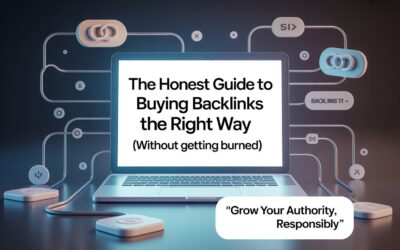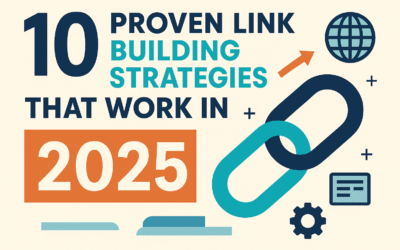If you’ve been in the SEO game for even a minute, you’ve probably heard the phrase: “Backlinks are the backbone of search rankings.” And it’s true backlinks still matter a lot.
But here’s the thing: not all backlinks are created equal.
Getting random links from shady directories or irrelevant forums won’t do your site any favors. What really moves the needle? Authority backlinks those golden nuggets from trusted, respected websites that Google actually cares about.
In this guide, we’re breaking down what authority backlinks are, why they matter, and exactly how to get them (the smart, sustainable way).
What Are Authority Backlinks?
Authority backlinks are links that point to your website from high-quality, reputable websites. Think:
- Industry-leading blogs
- Trusted news outlets
- Government (.gov) or education (.edu) sites
- Popular niche-specific websites with strong domain authority
These links act as a vote of confidence in the eyes of Google. The more credible the site linking to you, the more weight that backlink carries.
Quick Example:
If a food blog links to your restaurant’s website cool.
But if The New York Times or Bon Appétit links to your restaurant site? That’s a game-changer.
Why Do Authority Backlinks Matter?
Backlinks signal to search engines that your content is valuable, trustworthy, and worth ranking. Authority backlinks do this at a much higher level. Here’s what they bring to the table:
=> Higher Rankings
Search engines love trusted sources. When they see top-tier sites linking to your content, it increases your chances of climbing the SERPs.
=> More Organic Traffic
Ranking higher means more clicks, more views, and more people discovering your site naturally without paying for ads.
=> Credibility and Trust
Authority backlinks build your brand’s reputation. Users are more likely to trust your content when they see it referenced by respected sources.
=> Referral Traffic That Converts
People don’t just click. They engage, explore, and often convert especially when the backlink comes from a website they already trust.
So, How Do You Get Authority Backlinks?
Let’s dig into the strategies that actually work.
1. Create Truly Useful, Share-Worthy Content
We know you’ve heard it a million times. But here’s the truth:
Nobody links to boring content.
Create pages, blog posts, tools, or resources that solve real problems, answer real questions, or offer unique insight.
Ideas That Work:
- Original research and data studies
- Step-by-step tutorials
- Industry trend reports
- Expert roundups
- Free tools or templates
If your content genuinely helps people, it becomes link-worthy on its own.
2. Leverage Guest Blogging on High-Quality Sites
This strategy still works if you do it right.
Forget the generic “Write for us” spam. Instead, identify sites in your industry with real audiences and pitch them unique article ideas they haven’t covered yet.
Pro Tip:
Focus on providing value first. Make it about them, not just about getting your link in.
3. Get Featured in Roundups & Industry Listicles
Many blogs and publishers regularly post:
- “Top tools for [your niche]”
- “Best experts to follow in [2024]”
- “Resources for beginners in [industry]”
You can land links on these listicles by simply reaching out with a brief introduction and showing why your brand or resource fits the list.
4. Use HARO (Help a Reporter Out)
HARO connects journalists with sources. If you’re quick to respond to journalist queries, especially in your niche, you can land links on:
- News sites
- Authority blogs
- Magazines
These links aren’t just powerful for SEO they boost your brand image too.
5. Broken Link Building
This is a timeless link-building hack.
How it works:
- Find broken (dead) links on authoritative websites.
- Create (or point to) content that replaces the missing page.
- Reach out to the site owner and let them know politely offering your link as a replacement.
They get a fixed page. You get a backlink. Win-win.
6. Reclaim Unlinked Brand Mentions
Sometimes people mention your brand, product, or blog but don’t link to you. You can:
- Use tools like Ahrefs or Google Alerts to find mentions
- Reach out to kindly ask if they could add a link to your site
These are often low-hanging fruit quick wins with very little friction.
7. Collaborate with Other Experts
Think:
- Podcast interviews
- Expert quote contributions
- Co-branded guides or studies
- Webinars and virtual events
These often lead to mutual links, shared audiences, and long-term relationships in your niche.
8. Publish Industry Data or Case Studies
Original data is gold.
If you’ve conducted a survey, internal performance study, or gathered data others haven’t package it into an easy-to-read, link-worthy format.
People love referencing credible numbers and citing case studies in their content.
9. Turn Testimonials into Links
Brands love showcasing testimonials. If you’ve used a product or service, send them a genuine testimonial. Often, they’ll publish it on their website along with a backlink to your site.
It’s an underused tactic that can land some surprisingly good links.
10. Build Relationships (Not Just Links)
The truth is, backlinks are often a by-product of strong relationships in your niche.
Get active in:
- Industry forums
- Private communities
- Social media conversations
- Twitter/X spaces and LinkedIn threads
Be helpful. Share insights. Contribute to discussions. The backlinks will come.
Final Thoughts: Play the Long Game
Here’s the truth:
Authority backlinks don’t happen overnight. They take time, consistency, and real effort. But once they start coming in, they can completely change the game for your business boosting your visibility, traffic, and brand trust.
At Link Growth Lab, we help businesses like yours build powerful backlinks that drive real results without shortcuts, automation, or shady tricks. Just smart, sustainable strategies that work.
Ready to grow your site’s authority with quality backlinks?
Let’s talk: 👉 https://linkgrowthlab.com



